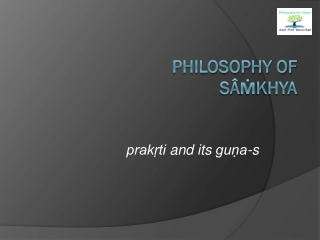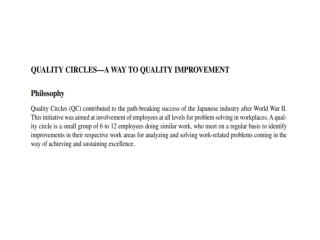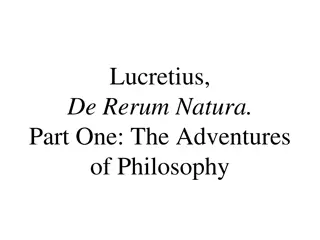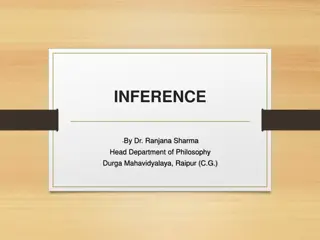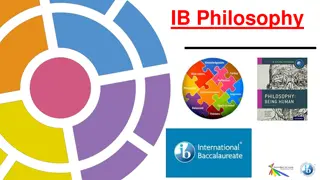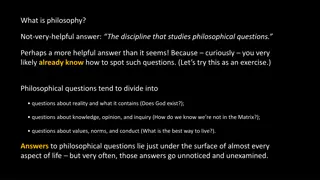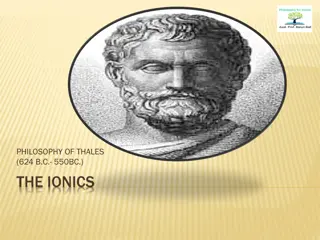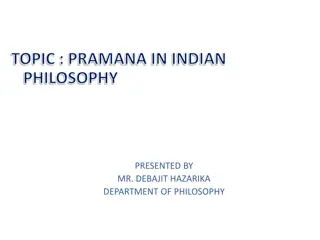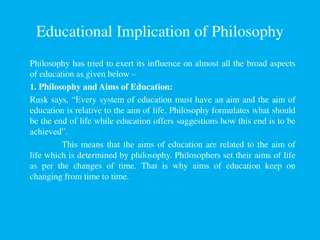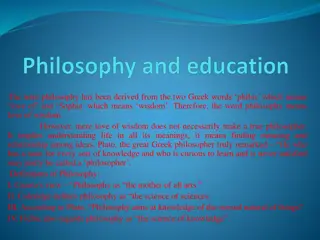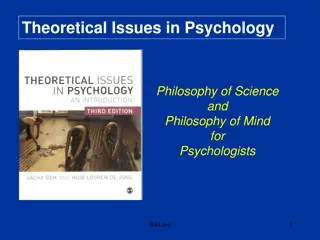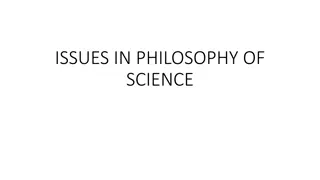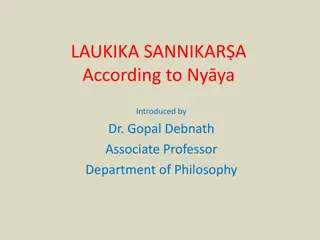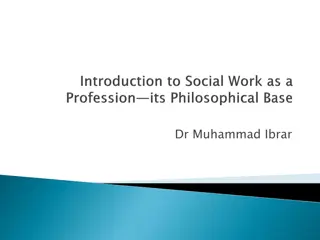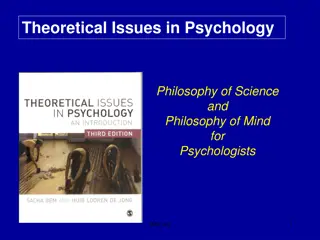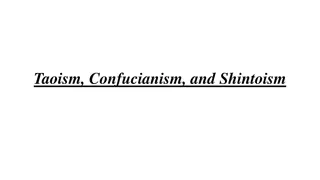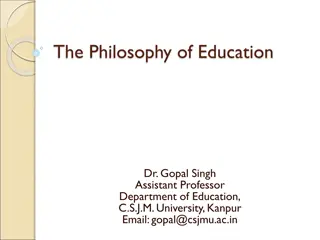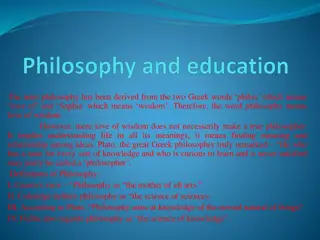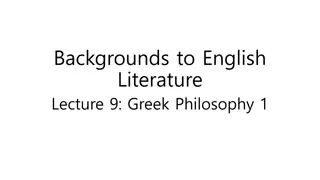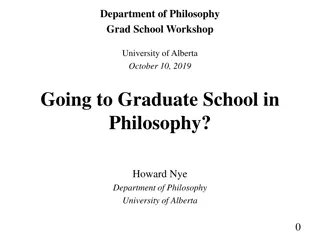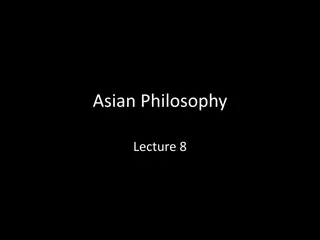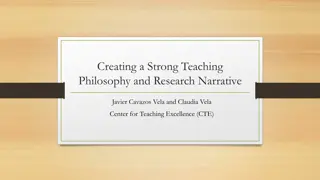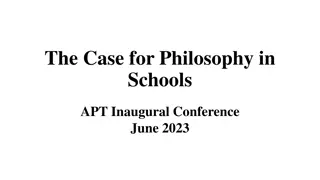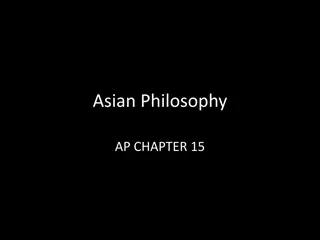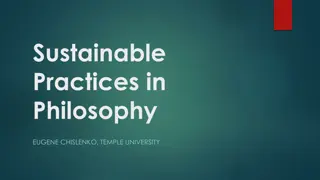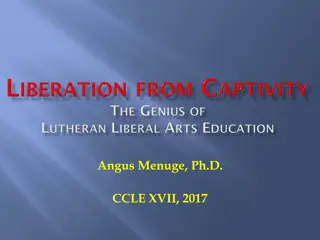Safety Philosophy and Disciplinary Program
The safety philosophy and disciplinary program at our company, including duties, measures, and classifications. Understand the limitations and importance of job hazard assessment and the Fatal Four Rules. Training and communication are key components of our corporate safety philosophy.
0 views • 22 slides
Understanding the Core Tenets of Samkhya Philosophy
Samkhya philosophy, one of the oldest systems of Indian philosophy, emphasizes a dualism between prakrti and purusa, with prakrti as the root cause of the world of objects. It maintains a plurality of purusa and remains silent on the concept of God. Prakrti is described as uncaused, independent, abs
1 views • 30 slides
YOGA PHILOSOPHY
Delve into the intricate world of yoga philosophy with Dr. SK Aktar Hossain in the AHPHI305SEC-I semester at Khatra Adibasi Mahavidyalaya. Discover the fundamental principles and teachings of yoga as a profound path to spiritual enlightenment and holistic well-being. This academic exploration aims t
2 views • 12 slides
Zero Defects Philosophy in Quality Management
Zero Defects Philosophy is a key principle in Total Quality Management, advocating for perfection in products and processes by eliminating defects completely. Philip Crosby popularized this concept, emphasizing that defects are never acceptable. Key concepts include "Quality is Free" and "Do It Righ
0 views • 19 slides
Perspectives on Reality: Idealism vs. Materialism in Philosophy
Philosophy delves into fundamental questions about existence and reality. This lecture explores contrasting viewpoints of idealism, which posits that reality is mental, and materialism, which argues reality is physical. Examples from philosophers like George Berkeley and Karl Marx exemplify these pe
1 views • 12 slides
Exploring Lucretius and De Rerum Natura: Philosophy, Poetry, and Materialism
Delve into the life and works of Roman philosopher and poet Lucretius, particularly his masterpiece "De Rerum Natura." Discover the blend of philosophy and poetry, the essence of atomistic materialism, and the themes of explanation, free will, and mortality explored in his writings.
3 views • 24 slides
Understanding Inference in Indian Philosophy
In Indian philosophy, inference is considered one of the six ways to attain true knowledge. It involves three constituents: Hetu (middle term), Sadhya (major term), and Paksha (minor term). The steps of inference include apprehension of the middle term, recollection of the relation between middle an
11 views • 8 slides
Exploring the World of Sociology through Philosophy
This philosophy course delves into engaging with influential thinkers, encouraging students to actively participate in philosophical activities. Covering topics on being human, ethics, religion, philosophical texts, and contemporary issues, it also emphasizes internal assessments and stimulating int
2 views • 15 slides
Understanding Philosophy: A Guide to Philosophical Questions and Debate
Philosophy delves into questions about reality, ethics, and knowledge. Studying philosophy involves constructing logical arguments to explore and understand these fundamental inquiries deeply. As a student, you'll develop critical thinking skills to engage in philosophical discussions and analyze di
0 views • 5 slides
Philosophy of Thales: The Ancient Wisdom of the Ionic School
Thales of Miletus, a key figure in the Ionic School of philosophy, is considered the father of philosophy. He believed that water was the principle of all things and made significant contributions to mathematics and astronomy. Thales's wisdom and engineering feats, such as diverting the river Halys,
0 views • 18 slides
Understanding Pramana in Indian Philosophy by Mr. Debajit Hazarika
Philosophy delves into the quest for knowledge, with Epistemology exploring sources and validity. In Indian philosophy, Prama signifies true cognition, attainable through Pramana - the means to achieve valid knowledge. This discussion covers the six pramanas within various philosophical systems and
2 views • 11 slides
Implications of Philosophy on Education
Philosophy plays a crucial role in shaping various aspects of education including aims, curriculum, textbooks, discipline, teaching methods, and teachers. It influences the goals of education, guides curriculum development, aids in textbook selection, determines disciplinary approaches, impacts teac
0 views • 7 slides
Understanding the Essence of Philosophy: Love of Wisdom and Pursuit of Knowledge
Philosophy, derived from Greek words meaning "love of wisdom," encompasses a deep understanding of life's meanings and the interconnections among ideas. It is more than mere curiosity but a pursuit of knowledge encompassing all aspects of existence and truth. Indian philosophy views it as a vision o
0 views • 6 slides
Theoretical Issues in Psychology: Philosophy of Science and Mind
Exploring the philosophy of science in psychology, this content delves into key concepts such as positivism, logical positivism, the Vienna Circle, and the scientific process according to positivists. It discusses influential thinkers like Wittgenstein, Popper, Kuhn, and Feyerabend, shedding light o
3 views • 35 slides
Challenges in Philosophy of Science: Explanation and Induction
The field of philosophy of science grapples with various issues, including the Problem of Explanation and the Problem of Induction. Aristotle's views on scientific explanation and the deductive-nomological model are discussed. The reliance on induction in science, drawing general conclusions from li
2 views • 11 slides
Inspiring Nature and Education: The Philosophy of David Sobel
David Sobel, a prominent thinker in nature and education, advocates for Place-Based Education, connecting students with their local environment. Through his 7 Design Principles for Children and Nature, he underscores the importance of adventure, fantasy, imagination, and animal allies in fostering h
0 views • 13 slides
Understanding Perception in Nyaya Philosophy: An Introduction to Laukika Sannikara
Nyaya philosophy defines perception as knowledge arising from the contact between a sense organ and its object, known as Sannikara. This contact can be direct or indirect, leading to various kinds of Sannikaras such as Sayoga, Sayokta-samavya, Samaveta-samavya, Samavya, and Viśeṣa-viśeṣabhāva
2 views • 10 slides
Understanding the Philosophy of Social Work: A Deep Dive into Ethical Principles and Moral Philosophy
Exploring the complexity of the philosophy of social work, this text delves into ethical principles, moral philosophy, and the evolving perceptions of social workers in society, highlighting the crucial role of philosophy in shaping social work practices and principles.
0 views • 7 slides
Modern Perspectives on the Philosophy of Mind in Psychology
Explore modern approaches to the philosophy of mind in psychology, including functionalism, the mind-brain identity theory, and the challenges faced by functionalists. Functionalism emphasizes the functional aspect of mental processes and their potential realization in various physical devices, whil
0 views • 20 slides
Understanding Taoism: Ancient Chinese Philosophy and Beliefs
Taoism, an ancient tradition deeply rooted in Chinese customs, focuses on the concept of the Tao, the ultimate creative principle of the universe. It emphasizes harmony with nature, spiritual immortality, and self-development through practices like meditation and feng shui, while also incorporating
0 views • 48 slides
Analytic Versus Continental Philosophy in the 20th Century: A Comparative Overview
In 20th-century philosophy, the divide between Analytic and Continental schools deepened but has seen recent attempts at reconciliation. Analytic philosophy emphasizes logic, language, and epistemology, requiring technical expertise, while Continental philosophy rejects metaphysical speculation and
0 views • 15 slides
Exploring the Philosophy of Education with Dr. Gopal Singh
Philosophy of education examines teachers' personal philosophies that influence their teaching methods. Engaging in philosophy helps clarify intentions and justifications logically. Understanding key notions like self-identity and purpose is essential. Philosophical inquiry involves metaphysics, epi
0 views • 25 slides
Subjects in Focus: Philosophy, Psychology, Education, Sociology, and Library Science
Delve into the realms of knowledge through subjects like Philosophy, Psychology, Education, Sociology, and Library Science, each offering a unique perspective on understanding and dealing with the vast expanse of human knowledge. Philosophy explores truth through Logic, Psychology delves into the hu
0 views • 25 slides
Exploring the Fascinating World of Philosophy of Physics at Oxford University
Dive into the captivating realm of Philosophy of Physics with insights on Epistemology, Metaphysics, Philosophy of Science, scientific methods, and philosophical perspectives on specific sciences. Delve into the intricate discussions on space, time, gravity, Quantum theory, and cosmology at Oxford,
0 views • 22 slides
Evolution of Applied Ethics in Philosophy
Philosophy, known as the love for wisdom, involves seeking fundamental truths about existence and relationships. In the 1960s and 70s, a shift towards applied ethics emerged as philosophers like Peter Singer emphasized making philosophical discourse accessible to laypersons. This shift was met with
1 views • 12 slides
René Descartes: Philosopher and Mathematician Extraordinaire
René Descartes, known as the Father of Modern Philosophy, made significant contributions to both philosophy and mathematics. Born in 1596 in France, Descartes received a Jesuit education and later worked as a Corps of Engineers applying mathematics to practical applications. His philosophical works
0 views • 15 slides
Exploring Philosophy: The Love of Wisdom and Fundamental Questions
Delve into the world of philosophy with a focus on the love of wisdom. Explore the basic questions of reality, value, and knowledge. Uncover the branches of philosophy and concepts like metaphysics, epistemology, and axiology. Understand the Greek and Sanskrit roots of philosophical terms and their
0 views • 16 slides
SCS Safety Orientation and Philosophy in Estonia Solar Project
In the Estonia Solar Project site safety orientation, key safety principles, fundamentals, and site rules are reviewed. The philosophy emphasizes the importance of safety in all operations, with zero tolerance for policy violations. Definitions of terms like substation and high voltage transmission
0 views • 79 slides
Philosophy of Biology: A Methodological Provocation Before the Emergence of Biology
Philosophy of biology before the formal establishment of biology as a discipline explores the evolution of terms and theories related to the science of life. By delving into key philosophical works from the 19th and 20th centuries, the interaction between history, philosophy, and science in the fiel
0 views • 13 slides
Understanding Philosophy: Day 1 Topics and Discussions
Explore the fundamental aspects of philosophy in Day 1 of the course "Possible Worlds" by Cathy Legg at the University of Waikato. Delve into topics such as the relevance of studying philosophy, metaphysics, defining time, and different forms of possibility and necessity. Engage in thought-provoking
0 views • 25 slides
Understanding Philosophy: The Search for Wisdom and Truth
The term "philosophy" originates from Greek words meaning "love of wisdom." True philosophy involves seeking meaning and connections among ideas, transcending mere curiosity. Various definitions emphasize philosophy as the foundation of all arts, the science of sciences, and the pursuit of eternal k
0 views • 6 slides
Greek Philosophy: Origins and Influential Thinkers
Greek philosophy originated with the Pre-Socratics in the Ionian School around 600 BC, focusing on naturalistic explanations and cosmological theories. Thales, Anaximander, and Anaximenes were key figures, each proposing unique elemental theories. Pythagoras emphasized the mathematical nature of the
0 views • 19 slides
Opportunities and Career Paths with a Graduate Degree in Philosophy
Pursuing a graduate degree in philosophy can lead to various career paths beyond academia, including roles in the government, law, ethics, editing, technology, and business. An MA in philosophy provides opportunities for skill development and exploration of philosophical ideas while keeping options
1 views • 29 slides
Exploring Sankhya Philosophy: Metaphysical Dualism and Causation
Delve into the ancient Sankhya philosophy, the oldest school of Indian philosophy founded by Kapila. Discover its metaphysical goal of avoiding monistic materialism and idealism, leading to a dualism between nature and spirit. Explore the concepts of Prakriti (Nature) and Purusha (Self), along with
0 views • 38 slides
Crafting a Strong Teaching Philosophy & Research Narrative Workshop
This workshop explores the key areas and structure of a statement of teaching philosophy, aiming to enhance participants' ability to evaluate and improve their teaching and research philosophies. Participants will reflect on personal beliefs, values, and strategies to create an effective teaching ph
0 views • 15 slides
Philosophy and Ethics A Level Overview: Religion, Ethics, and Christian Thought
This is an A Level overview of Philosophy and Ethics, focusing on topics such as Philosophy of Religion, Religious Ethics, and Developments in Christian thought. Students will explore concepts like the existence of God, moral issues, ethics, and more, challenging their intellectual capabilities and
0 views • 10 slides
Unlocking the Creative Potential of Philosophy in Schools
Exploring the unique benefits of teaching philosophy in schools as a comprehensive package, this discussion emphasizes the creative aspects of philosophy, such as philosophic imagination and diverse styles, alongside traditional analytical approaches. By incorporating thought experiments, counterfac
0 views • 24 slides
Understanding Yin-Yang Philosophy in Asian Culture
Explore the essence of Yin-Yang philosophy with a focus on the Yijing (Book of Changes) and I Ching. Discover how this ancient Chinese philosophy embodies the principles of nature, change, and balance through the interplay of Yin and Yang forces. Delve into the core insights and consulting methods o
0 views • 18 slides
Sustainable Practices in Philosophy: Shifting Towards a Greener Future
This workshop led by Eugene Chislenko from Temple University focuses on recent efforts towards sustainable practices within philosophy. It emphasizes the importance of addressing climate change, organizing networks, and advocating for sustainable guidelines in the field of philosophy. The initiative
0 views • 17 slides
Philosophy of Liberal Arts Education and Freedom
Classical education programs at CUW emphasize a philosophy major with a focus on primary sources, history of philosophy, worldviews, bioethics, and apologetics. This education model seeks to equip individuals for freedom, drawing on the roots of liberal education in the concept of liberty as a means
0 views • 47 slides

